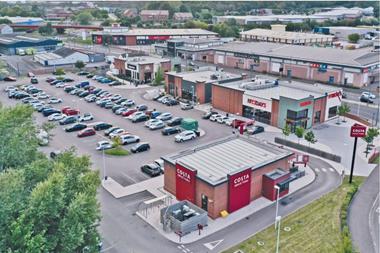Over the past year, real estate investors have been piling into the life sciences and logistics sectors en masse.

Until recently, these have been perceived as the most lucrative and future-proof investment opportunities in property. Short- and medium-term predictions for logistics look reassuring, with some estimates claiming that the UK alone will need an extra 60m sq ft of warehouse space by 2025.
There is no reason to think that consumer thirst for online shopping will dramatically decline any time soon – the pandemic has demonstrated the convenience, efficiency and safety of virtual shopping. It has also shown the undeniable need for quality R&D facilities, without which crucial advances in medicine and healthcare would get delayed.
However, as thousands of private and institutional investors rush to secure these assets, their pricing inevitably adjusts and starts reflecting the depth of demand. Logistics and life sciences have reached high pricing levels, which gives us reason to take a step back and compare them to other, less straightforward and currently neglected asset types, like retail.
Over the past 12 months, logistics yields have hardened by a further 50bps to 100bps as a result of rising investor confidence, which should act as a prompt: buyers need to start looking beyond the obvious and overcome the asset allocation inertia we have been guilty of since the outbreak of Covid.

However counterintuitive it may seem, the retail sector is showing reliable signs of recovery, aided by the speedy roll-out of the vaccination programme and easing of lockdown restrictions. According to recent data from retail analysts, UK high streets saw an average 17.4% rise in footfall during the first week of June compared with the week before.
Echoing these findings are the figures shared by Westfield, whose London sites had more than one million visits in the week starting 12 April (75% up on the 2019 level).
We’re also witnessing a significant uptick in retail spending – according to the latest BRC-KPMG Sales Monitor, sales were up by 23.7% in May on the same month in 2019.
Some of that is undoubtedly driven by the savings accumulated by consumers during lockdowns, but the most important factor is the demand for social experiences and interactions, which have become all the more valuable after a year of on-off confinement.
Since the start of the year, we’ve seen strong levels of interest in the retail sector. At our June commercial property auction, we sold £47.4m worth of retail assets – 77% of the total assets sold through commercial auction that month.
Shopping centres, an asset hit particularly badly by the pandemic, have attracted healthy investor interest since the start of 2021 – Allsop has sold five so far, with net yields ranging from 15% to 18%. Often well located, in or close to town centres, these properties offer significant value-add repositioning and redevelopment opportunities across mixed-use and residential.
We are also seeing some very interesting, well-located vacant department stores coming to the market, which give huge opportunities for mixed-use development in town and city centres, with 100% prime locations.
The challenge ahead
Since May 2020, tenants and landlords have found themselves in a complex and untenable situation, with the former struggling to make rent payments because of forced closures and the latter prevented from taking actions to force tenants to meet their rental obligations. There really hasn’t been much from central government to help the ‘beaten-up’ retail landlord.
The extension of the moratorium on evictions for non-payment of rent to March 2022 is a cause for concern for those looking to invest in the sector.
However, with the majority of Covid restrictions now lifted and the 19 July deadline for lifting the final restrictions imminent, tenants are required to make rental payments, which is good news for newcomers to the sector.
The government has also announced plans for an arbitration scheme to help solve disputes between landlords and occupiers once the moratorium comes to an end, which is a positive sign for existing retail property owners.
We don’t know what the future holds, but it’s safe to assume that once international travel fully resumes, we will see a surge in foreign capital ready to be deployed.
With that in mind, I would advise any property investor to shed their much-maligned view of the retail sector and not ignore this phoenix, which appears to be rising unnoticed from the ashes. Now is the time to start searching for potentially lucrative retail opportunities, while the ‘summer sale’ is still on.
Scott Tyler is senior partner at Allsop
































No comments yet